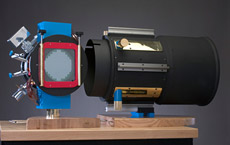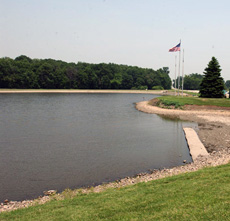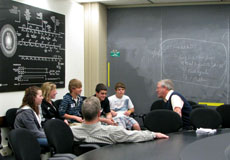|
Wednesday, May 28
3:30 p.m.
DIRECTOR'S COFFEE BREAK - 2nd Flr X-Over
4 p.m.
Fermilab Colloquium - One West
Speaker: S. Kopeikin, University of Missouri, Columbia
Title: Testing General Relativity in Fermilab
Thursday, May 29
1 p.m.
Physics and Detector Seminar - West Wing WH-10NW
Speaker: T. Barklow, Stanford Linear Accelerator Center
Title: Understanding the Requirements for Jet Energy Resolution
Speaker: T. Rizzo, Stanford Linear Accelerator Center
Title: Jet Energy Studies at 1 TeV
2:30 p.m.
Theoretical Physics Seminar - Curia II
Speaker: H. Lee, University of Florida
Title: Proton and Dark Matter Without R Parity
3:30 p.m.
DIRECTOR'S COFFEE BREAK - 2nd Flr X-Over
4 p.m.
Accelerator Physics and Technology Seminar - One West
Speaker: T. Peterson, Fermilab
Title: Cryogenics for Warm Physicists and Engineers
Click here for NALCAL,
a weekly calendar with links to additional information. |
|
Wednesday, May 28
- Cajun style lentil soup
- Cajun chicken ranch
- Tilapa w/jalapeno lime sauce
- Parmesan baked pork chops
- Smoked turkey panini pesto mayo
- Assorted slice pizza
- Chicken alfredo fettucine
Wilson Hall Cafe Menu |
|
Wednesday, May 28
Lunch
- Asian grilled beef salad
- Coconut cake
Thursday, May 29
Dinner
- Closed
Chez Leon Menu
Call x4598 to make your reservation. |
|
|
Dark Energy Camera gets green light for construction

DECam - The Dark Energy Survey camera, 1/3 scale model
Fermilab's Dark Energy Camera project has received the go-ahead from the Department of Energy to begin construction. The project will build a next-generation digital dark energy camera for the Blanco Telescope atop Cerro Tololo in the Chilean Andes. DECam will map the galaxies in the southern hemisphere as part of the Dark Energy Survey's exploration of the properties of dark energy. On May 20, the project received "CD-3a" approval from DOE, allowing DECam to spend funds for "limited" construction.
The approval, a key milestone for DECam, followed a January review of the Dark Energy Survey by DOE and the National Science Foundation and "CD-2" approval on April 29 of DECam's cost, schedule and performance baselines.
"There is no more fascinating question in science today than the nature of dark energy," said Fermilab Director Pier Oddone. "At Fermilab, we are excited to embark on the DECam project that will take the next step in identifying the mysterious force that is pushing the universe apart."
The DES experiment comprises three projects, of which NSF funds two, the Cerro Tololo Inter-American Observatory Facilities Improvement Project and the DES Data Management System. DOE funds the Fermilab-led DECam, the largest of the three.
The current schedule calls for approval in January 2009 for DECam to start full construction, with the delivery of
DECam to CTIO in December 2010.
|
Click with care: update on latest phishing attack

Dilbert ©2008, United Feature Syndicate, Inc.
Fermilab employees and users recently weathered a realistic phishing attack and learned to click with care.
On Wednesday, May 21, all staff and users received a warning about the latest phishing e-mail to bombard Fermilab. Most phishing e-mails are
relatively easy to identify. However, this one did manage to fool some
people, at least convincing them to go as far as visiting the Web site included in the e-mail. A few were enticed to the next step of entering information about themselves.
No one, apart from our own computer security team
deliberately investigating, went through to the final step that would
have infected their computer.
Prompt action by the computer security team helped to contain the
damage. You might wonder why this particular e-mail tripped people up.
That is because it was the work of a knowledgeable insider - in fact, our
very own DOE launched the "attack" on Fermilab and several other laboratories
in the form of a training request related to new HSPD-12 badges.
DOE did this as an assessment of the laboratories' defenses. Members of DOE's "Red Team" have been given permission by DOE-HQ to conduct unannounced assessments.
Once again, this is a reminder to be careful what you click on.
-- Vicky White, Computing Division head
|
Swan Lake water level adjusted for planting

Swan Lake
Some of you might have noticed lowered water levels in Swan Lake during the weekend. Roads and Grounds staff members lowered the levels to conduct planting on the lake's shore Thursday night. Staff members refilled the lake on Tuesday.
|
Rotolo Middle School students give collider reports

On Friday, May 23, eighth-grade students from Rotolo Middle School presented reports on the ILC to Fermilab scientists. The reports, which were assigned as part of the students' science curriculum, explored the science, structure and collaborative nature of the proposed linear collider experiment.
|
New measurements reveal slimmer Milky Way
Sloan Digital Sky Survey press release,
May 27, 2008
The Milky Way galaxy has lost weight. A lot of weight. About a trillion suns' worth.
It wasn't a galactic diet that accounted for the recent slimming, but a more accurate scale. This weighty discovery from the Sloan Digital Sky Survey (SDSS-II) has broad implications for our understanding of the Milky Way.
"The galaxy is slimmer than we thought," said Xiangxiang Xue of the National Astronomical Observatories of China, who led an international team of researchers. "That means it has less dark matter than previously believed, but also that it was more efficient in converting its original supply of hydrogen and helium into stars." Xue is presently pursuing a doctoral thesis at the Max Planck Institute for Astronomy (MPIA) in Heidelberg, Germany.
The discovery, accepted for publication in The Astrophysical Journal, is based on data from SEGUE, an enormous survey of stars in the Milky Way -- one of the three programs that comprise SDSS-II. Using SEGUE measurements of stellar velocities in the outer Milky Way, a region known as the stellar halo, the researchers determined the mass of the Galaxy by inferring the amount of gravity required to keep the stars in orbit. Some of that gravity comes from the Milky Way stars themselves, but most of it comes from an extended distribution of invisible dark matter, whose nature is still not fully understood.
Read more
|
|
|
Twenty five years
Scott Dodelson, the acting head of the Center for Particle Astrophysics, wrote this week's column.
 |
| Scott Dodelson |
This year, Fermilab's Theoretical Astrophysics Group celebrates its 25th anniversary.
The group began in 1983 when Leon Lederman and David Schramm decided the close connections between particle physics and cosmology warranted more attention. They recruited Rocky Kolb and Michael Turner to start the astrophysics program here.
Cosmology has matured significantly since then. Evidence for dark matter has solidified, and inflation has graduated from the speculative idea of a few to a theory that has passed half a dozen tests with flying colors. We now know that neutrinos have mass, which has an impact on the evolution of structure in the universe. We also know that dark energy dominates the universe. Underlying all these developments is the successful construction of a theory that explains how structure in the universe formed.
Although many people around the world contributed to these successes, I feel that Fermilab's group deserves a fair share of the credit. We studied inflation's predictions, and developed arguments that inflation is testable and therefore real science. We suggested numerous models for dark matter, again focusing on experimental tests. We wrote papers on dark energy in the mid-1990s and held the first workshop on it in 1998. Albert Stebbins, now head of the group, was the first to understand that the polarization field of the cosmic microwave background may contain a smoking gun signature of primordial gravity waves. We helped initiate much of the experimental astrophysics program that Fermilab has joined and led.
Perhaps just as important, we also trained dozens of postdocs and Schramm Fellows who have gone on to faculty positions at universities worldwide. I hope that Leon, Rocky and Michael look at the group they founded with pride. We are determined to uphold the legacy that they and David Schramm passed on by continuing to strive for excellence.
On behalf of the Center for Particle Astrophysics, it is a pleasure to welcome Craig Hogan as Director. He starts at the end of June. We all look forward to helping him implement his vision for the future.
|
ES&H weekly report, May 27
This week's report, compiled by the ES&H Section, lists no accidents for the past three weeks. One minor first aid injury involving an exacto knife was reported last week. The incident reporting system was not working, preventing entries or updates to the database. Details will be reported in next week's handout. Find the full report here.
Safety report archive
|
|
Women can provide feedback on work environment May 28
Calling all female staff, users and student and senior scientists. Fermilab Deputy Director Young-Kee Kim would like to hear about your work environment at Fermilab. Please join her for a lunchtime meeting from noon-1 p.m. on May 28. The meetings will take place in the small dining room in the southwest corner of the atrium in Wilson Hall. Please bring your lunch. To arrange a private meeting with Young-Kee Kim, please contact Marilyn Smith via e-mail.
New Perspectives Conference June 3
The 2008 Annual New Perspectives Conference will take place on June 3 in
conjunction with the Users' Meeting. The one-day conference offers talks
given by and geared towards undergraduate, graduate and post-doctoral
physicists. The conference includes a poster session. Please click
here for more information.
Fermi Research Alliance, LLC (FRA) retirement plan changes
The Summary Plan Description for the FRA Retirement Plan has been updated to reflect a major change to the plan:
A terminated participant is not subject to the age and service requirement in order to be eligible for a cash withdrawal. You may elect a cash distribution from TIAA and CREF Retirement Annuities. Withdrawals from the TIAA Traditional Retirement Annuity accumulations are only possible using a Transfer Payout Annuity (TPA). If the accumulation is less than $10,000, it would be provided in one lump sum. The Summary Plan Description for the Retirement Plan is posted on the Benefits Web site for your review.
Accelerated C++: A Short Course in Practical Programming by Example
On June 2, Fermilab will offer the first session of Accelerated C++: A Short Course in Practical Programming by Example.
The Short Course is an extended professional development experience that emphasizes computer programming in modern standard C++. No tuition is charged; the only cost is for the required textbooks. (A subsidy is available for most students.) Participants receive TRAIN credit upon successful completion of the eight-session course. Course registration is now open.
Heart risk screening June 3, 10
Wellness Works and Delnor-Community Hospital will offer a heart risk screening on Tuesday, June 3, and Tuesday, June 10. The assessment will take place by scheduled appointment between 6:30 a.m. and 10:45 a.m. for Fermilab employees in the EOC on the ground floor of Wilson Hall. Those interested can sign up on the ES&H Web page. Participants must fast for 12 hours but can drink water.
June 6 deadline for The University of Chicago Tuition Remission Program
The deadline for applying for the tuition remission program at The University of Chicago for the Summer 2008 quarter is June 6. For more information and enrollment forms, contact Nicole Gee at x3697 or visit the Web site.
International Folk Dancing
special workshop Thursday
International Folk Dancing will host a special workshop on Bulgarian dance on Thursday, May 29, at 7:30 p.m. at Kuhn Barn. Jaap Leegwater, visiting from the Netherlands, will teach the course. Leegwater introduced a number of folk dance favorites during the 30 years he has taught worldwide and will include some of favorites in the workshop. Newcomers are welcome and you do not need to come with a partner. Get more information at 630-584-0825 or 630-840-8194 or folkdance@fnal.gov.
Additional Activities
|
|